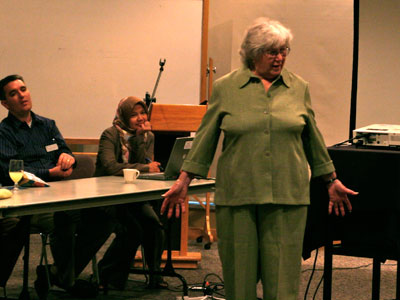“Language thinks us,” said Joanne Greenberg, a professor of creative writing at the Colorado School of Mines, during the first of many Hennebach lectures this semester.
Although an awkward phrase, “language thinks us” refers to the way that a person’s perception of reality can be traced back to the organization and foundations of their language. As Greenberg explains, an English speaker’s definition and viewpoint of time is based off the English language. “We think of time in past-present-future because that’s the way our language is structured,” Greenberg said. “The present does not exist as English speakers think of it, because what is now just became the past, and now is once again the past.”
| Kevin Emery / Oredigger |
Greenberg also presented the idea that when people switch from one language to another, they can alternate between different personalities. For example, her father, an immigrant from Eastern Europe, was an extremely reserved person when he spoke English, yet the moment he started speaking Yiddish, he became much more animated. This was confirmed by several members of the audience who were bilingual, including one self identified Hispanic man who described that when speaking in Spanish he used completely different facial expressions and many more gestures than he did speaking English.
Then Greenberg continued to explain how structure is essential to language. It is something that all kids can automatically grasp. “A child, in 18 months, learns most complex series of pass-throughs and pass-bys that restructure the language.” This allows children to understand language simply by listening to it and effectively picking it up. Greenberg also said, “By the age of ten, your learner’s permit expires and you’re stuck… I know a lot of Greek words but I don’t speak Greek,” said Greenberg. This skill continues until a child reaches the age of 10 when learning a language becomes extremely difficult, explaining why many struggle to learn a second language.
The structure and organization of languages is an interesting topic, and one that is layered with details. As Greenberg continues to uncover new intricacies, it is clear that language will continue to play a dominant role in our lives.
The Hennebach lectures continue through the rest of the year, covering a wide range of topics. The next lecture, titled “Renewable Energy Implementation for Rural Economic Development” will be presented by Tri Mumpuni September 26 in Metals Hall.



'A new way to look at langauge' has no comments
Be the first to comment this post!